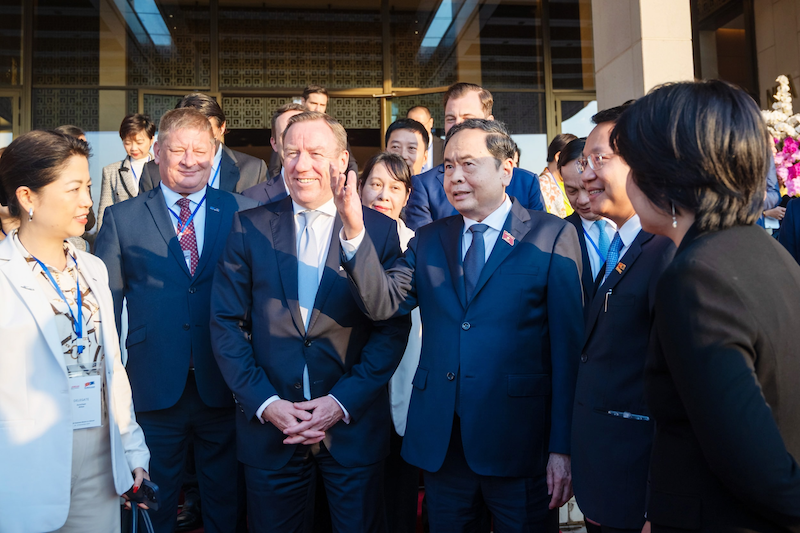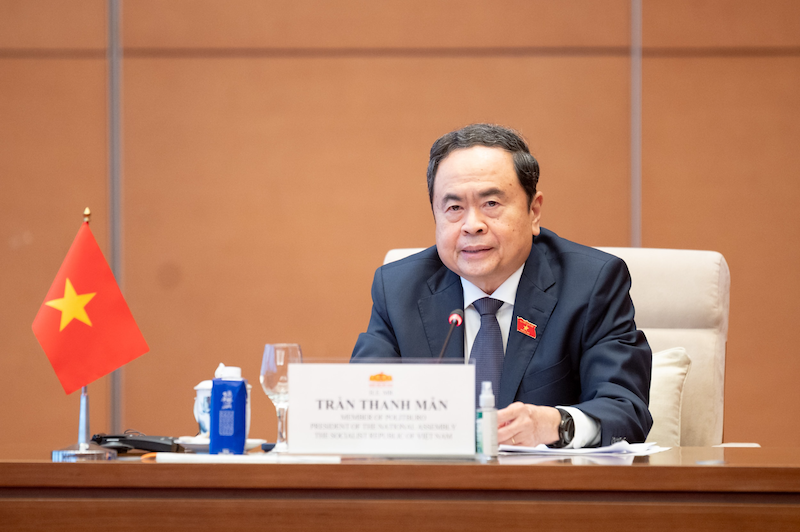Vietnam urges European businesses to support EVIPA ratification and investment growth
National Assembly Chairman Tran Thanh Man called on European business leaders to back the ratification of the EU–Vietnam Investment Protection Agreement and deepen cooperation across key economic sectors during a high-level meeting in Hanoi.
Chairman of the National Assembly Tran Thanh Man has urged European businesses to help accelerate the ratification of the European Union–Vietnam Investment Protection Agreement (EVIPA) and create a new breakthrough in bilateral investment ties.
According to Man, the seven EU member states that have not ratified the EVIPA are Ireland, Austria, Belgium, Germany, the Netherlands, France and Slovenia.

National Assembly's Chairman Tran Thanh Man and delegates of the EU–ASEAN Business Council. Photos: daibieunhandan.vn
Speaking at a meeting with the EU-ASEAN Business Council and the European Chamber of Commerce in Vietnam (EuroCham) on November 24, Man encouraged European enterprises to advocate for the European Commission to lift its IUU “yellow card” warning on Vietnam’s seafood exports, helping ensure stable supply chains for the EU market.
He noted that the European-ASEAN Business Council, the EuroCham and their member companies have long served as important partners of Vietnam. He called for their continued support in effectively implementing the EU–Vietnam Free Trade Agreement (EVFTA).
The chairman said stronger cooperation under the EVFTA will help open markets further and reinforce the position of Vietnam and the EU as each other’s leading trade partners.
Man encouraged European business associations to deepen dialogue with the Vietnamese National Assembly and Government, especially on institutional reform, policy impact assessment, business consultations and legal transparency.
Such exchanges, he said, will help Vietnam improve its policy framework in line with international standards and build a more stable, predictable and competitive environment for European investors.
Vietnam welcomes European investment in a wide range of priority sectors, from high technology, green growth and renewable energy to transportation infrastructure, environmental solutions, smart cities and sustainable fisheries.
Chairman Man emphasized that Vietnam hopes European companies will support domestic firms in integrating more deeply into EU supply chains through technology transfer, quality-standard cooperation and connections with leading European corporations.
"The National Assembly remains committed to listening to and addressing recommendations from the business community, including European enterprises," said Man.
Ongoing efforts aim to reduce regulatory burdens, strengthen legal transparency and create a flexible, pro-business regulatory environment that supports both domestic and foreign companies," he added.

National Assembly's Chairman Tran Thanh Man speaks at the meeting.
Man said lawmakers will continue working closely with enterprises to ensure that new policies remain practical and responsive to the needs of major investment projects, emerging technologies and sustainable-development initiatives.
In recent years, the National Assembly has carried out major reforms to improve Vietnam’s legal system and strengthen the investment climate. Work is underway to revise and refine laws to match evolving economic realities, helping businesses grow and enhancing Vietnam’s global competitiveness.
At the meeting, Jens Ruebbert, Chairman of the EU-ASEAN Business Council, said the dialogue helps European companies better understand Vietnam’s priorities and identify areas for deeper cooperation that support shared economic goals.
European business representatives shared a range of substantive recommendations, reflecting strong interest in Vietnam’s investment landscape.
These included comments on the draft resolution on energy development for 2026–2030, the draft Law on Disease Prevention, mechanisms governing the Prevention Fund and regulations related to pharmaceuticals and health supplements.
They also proposed improvements to the law-making process, especially strengthening policy impact assessments and expanding consultations with the business community.
Ruebbert noted that more than 120 representatives from over 40 leading EU companies joined the meeting, demonstrating the strong interest of European businesses in Vietnam.
He said Vietnam–EU relations have expanded dynamically across many sectors, with the EVFTA helping bilateral trade grow 10%–15% annually. The EU remains one of Vietnam’s most important economic partners, while Vietnam is the EU’s 16th-largest trading partner and its largest in ASEAN.
European companies value Vietnam’s efforts in trade liberalization, economic reform, macroeconomic stability, export competitiveness and rapid digital transformation, Ruebbert said.
He added that these strengths have consolidated Vietnam’s position as a leading investment destination in ASEAN, especially in high-tech manufacturing, services and renewable energy.








